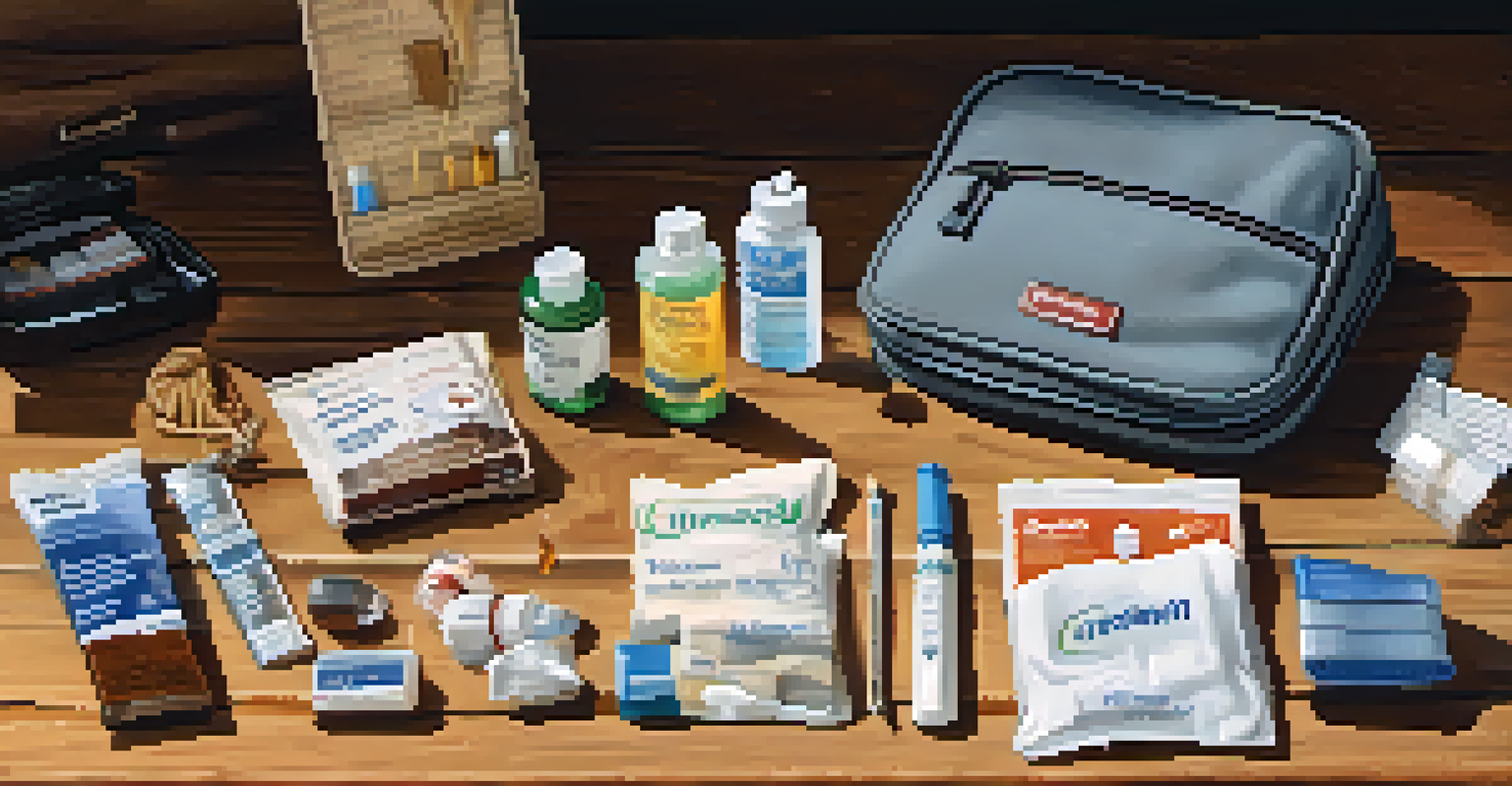How to Prepare for Health Risks in Developing Countries

Understanding Health Risks in Developing Countries
When traveling to developing countries, it's crucial to recognize the unique health risks that may arise. Infectious diseases, poor sanitation, and limited access to healthcare can pose serious threats. For instance, illnesses like malaria and typhoid are more prevalent in certain regions, making awareness key to prevention.
Traveling tends to magnify all human emotions.
Additionally, environmental factors such as air quality and water safety can significantly impact your health. It's not just about the diseases you might catch; the overall health environment is different than what you may be used to. Understanding these risks can help you prepare effectively.
By familiarizing yourself with the specific health challenges of your destination, you can take proactive steps to mitigate them. Knowledge is your first line of defense when navigating health risks abroad.
Vaccinations and Medication: What You Need
Before embarking on your journey, ensure you are up-to-date on necessary vaccinations. Some vaccines, like those for hepatitis A or yellow fever, are crucial depending on your travel plans. Consulting a healthcare provider can guide you on what's essential for your specific destination.

In addition to vaccinations, preventative medications can be lifesavers. For example, if you're traveling to a malaria-endemic area, antimalarial drugs can help protect you. Make sure to discuss your itinerary with a travel medicine specialist to get tailored advice.
Understand Health Risks Abroad
Recognizing unique health risks, such as infectious diseases and poor sanitation, is crucial when traveling to developing countries.
Being proactive about your health can mean the difference between a fun trip and a stressful ordeal. Proper preparation can help keep you safe and allow you to focus on enjoying your adventure.
Packing a Health Kit for Travel
Creating a health kit is one of the best ways to prepare for potential health issues while traveling. Start with basic medications like pain relievers, antihistamines, and any personal prescriptions you may need. Don't forget items like band-aids, antiseptic wipes, and a thermometer.
The journey of a thousand miles begins with one step.
You should also consider including travel-specific items such as oral rehydration salts for dehydration or insect repellent to ward off bug bites. These small additions can significantly enhance your comfort and safety during your travels.
Remember, being prepared doesn't just mean treating illnesses; it also means preventing them. A well-stocked health kit can empower you to handle minor issues before they become major problems.
Research Local Healthcare Facilities
Before you travel, take the time to research the local healthcare facilities at your destination. Knowing where the nearest hospital or clinic is can save precious time in an emergency. Look for facilities that cater to international travelers, as they may offer better standards of care.
Also, consider checking reviews or recommendations from fellow travelers. Websites and travel forums can provide insights into the quality of care you can expect. This information can help you feel more secure knowing you have access to help if needed.
Pack Essential Health Supplies
Creating a well-stocked health kit with medications and preventive items can help you address health issues during your travels.
Finally, note the contact information for local healthcare providers and keep it handy. A little preparation can go a long way in ensuring your safety and peace of mind while abroad.
Maintaining Food and Water Safety
One of the biggest health risks in developing countries often comes from food and water. Contaminated water can lead to severe gastrointestinal issues, so drinking bottled or purified water is essential. Always check seals on bottled water to ensure it hasn't been tampered with.
When it comes to food, try to eat at reputable establishments where hygiene practices are evident. Street food can be tempting, but it’s important to assess the cleanliness of the vendor and the cooking methods used. Cooking food thoroughly can also help reduce the risk of foodborne illnesses.
By being cautious about what you consume, you can significantly lower your risk of falling ill during your travels. After all, enjoying the local cuisine shouldn’t come at the cost of your health.
Staying Informed About Disease Outbreaks
Keeping yourself informed about any disease outbreaks in your destination country is crucial for your safety. Websites like the CDC or WHO provide updates on health advisories and outbreaks. This information can help you make informed decisions about your travel plans.
If an outbreak occurs while you’re traveling, follow local health guidelines and take necessary precautions. This might include avoiding certain areas or taking extra measures to protect yourself. Staying aware can help you adapt quickly to changing situations.
Stay Informed and Prepared
Researching local healthcare facilities and staying updated on disease outbreaks can enhance your safety and peace of mind while traveling.
Remember, knowledge is power. By staying informed, you can navigate potential health risks with confidence and enjoy your travels to the fullest.
Travel Insurance: A Safety Net for Health Risks
Investing in travel insurance can provide peace of mind when it comes to health risks. A good travel insurance policy can cover medical expenses, evacuation, and trip cancellations due to health issues. This safety net can be invaluable, especially in countries with limited healthcare options.
When selecting insurance, ensure it includes coverage for the specific activities you plan to engage in, as well as any pre-existing conditions. Read the fine print to understand what is and isn’t covered, so you're not caught off guard.

Ultimately, having travel insurance means you can focus on enjoying your trip rather than worrying about what might happen. It's a small price to pay for the assurance that you're protected.
Staying Healthy While Traveling: Daily Tips
While it’s important to prepare for health risks, maintaining your health during your trip is equally crucial. Stay hydrated by drinking plenty of safe fluids, and make sure to eat a balanced diet. Regular meals can help keep your energy levels up, especially if you're exploring new environments.
Incorporate simple health routines, like washing your hands frequently and using hand sanitizer. These small actions can significantly reduce your chances of getting sick. Make it a habit to prioritize your health, even amidst exciting adventures.
Finally, listen to your body. If you feel unwell, take a break and seek medical attention if needed. Prioritizing your health ensures that your travel experience remains enjoyable and fulfilling.